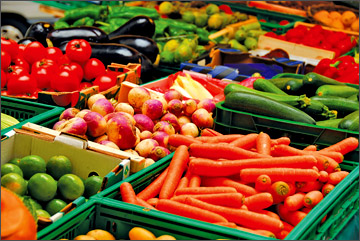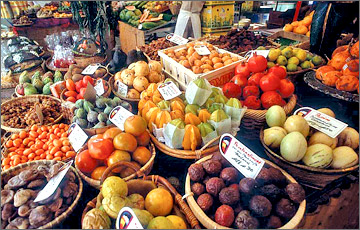|
Rising food prices maybe here to stay
Marina Primorac
*Bad weather, richer people, trade curbs, biofuel leading to pricier
food
*Costlier food risks higher core inflation in emerging, developing
countries
*Far-reaching impact, especially on the poor

Vegetables

Fruits and other nutritious things on sale |
Steady rises in the price of food since 2000 seem to be a trend, and
not just the result of temporary factors, caution IMF economists Thomas
Helbling and Shaun Roache in a Finance & Development (F&D) magazine
article.
The IMF’s food price index - which tracks the spot prices of the 22
most internationally traded agricultural food items - is now close to
the spike previously reached in June 2008.
Many countries are struggling with the implications of these high
food prices, which exacerbate poverty, inflation, and - for countries
that import food - the balance of payments. The implications are far
reaching. Witness the recent social unrest in the Middle East and North
Africa, some say in response to high bread prices.
Everyone notices when food prices go up. But the poor are hit
especially hard because food makes up a much larger share of their total
expenditures. They have little room to buy cheaper food items or to
spend less on other purchases.
In addition to food prices, the latest issue of F&D focuses on Latin
America’s potential to become a global economic player, how countries
can cope with the rising cost of health care, and whether public
investment in infrastructure is productive.
Not just bad news
Floods, droughts and wildfires around the world have reduced harvests
and pushed prices up. But it’s not just bad news that’s causing the
increase.
As people get richer, they eat more high-protein foods like meat,
dairy products, edible oils, fruits and vegetables, and seafood, and
less staple grains. This increases demand for land and for crops that
are used to feed animals, and that pushes up the price of staple grains
as well.
Another factor leading to food price increases has been the recent
boom in bio-fuels. High oil prices, combined with Government support for
the production of bio-fuels, have boosted demand for agricultural crops
from which bio-fuels are produced, such as corn, sugar, palm kernels,
and rapeseed. And their prices have risen as a result.
High oil prices also have a direct impact on the cost of producing
food. Fuel, including natural gas, is used to produce fertilizers, and
also in all stages of agricultural production, from sowing to harvesting
to distribution.
The increased demand for agricultural commodities is not likely to be
matched by an increase in production, at least any time soon. Growth in
the yield of a hectare of land has stagnated, and it’s hard to find more
land to devote to food production.
Fueling inflation
The surge in international food prices has already caused consumer
price inflation in many economies in early 2011. Such direct
“first-round” effects are part of the normal pass through of prices, and
will fade with time.
But if people expect food prices to continue to go up in price, they
begin to demand higher wages, and this leads to “second-round” effects:
an increase in core inflation.
Helbling and Roache argue that the risk of core inflation rising is
slim for advanced economies, but significant for emerging and developing
countries. In the latter group, food is more important a budget item and
confidence in monetary policy is lower, which means higher wage demands
and expectations of further inflation.
While factors like bad weather are hopefully - temporary, the main
causes underlying the structural change in global food markets will not
be reversed.
Technological advances and increased acreage devoted to food
production may help ease pressures on food markets, but that will take
time. In the meantime, the world may have to adjust to higher food
prices.
IMF Survey online
|



